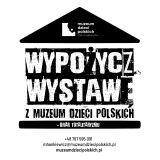back...Exhibitions of the Museum of Polish Children – Victims of Totalitarianism

How can you easily arrange an exhibition space in your school that will inspire your school community to carry out out-of-the-box historical or educational activities?
How do we get young people to learn about history told from the perspective of their peers?
We encourage you to rent the exhibitions of the Museum of Polish Children – Victims of Totalitarianism in Łódź free of charge.
The educational offer of the Museum of Polish Children includes exhibitions on the fate of Polish children and young people during the German and Soviet occupations, which are an excellent didactic tool to broaden young people's knowledge of the Second World War.
A rich selection of archive photos and evocative personal recollections encouraging the audience to delve into the story as well as letters and accounts of participants in historical events, combined with modern graphic design, create a consistent whole with interesting content that is emotionally and visually attractive to all those who want to learn about the history of Poland in the 20th century.
The exhibitions are an interesting proposition because they juxtapose the past with the present, touch on the dilemmas of contemporary youth with their experiences of migration and war, and can be an inspiration for young people seeking answers to questions about values that are guidelines for their entire adult life.
"Urszula Kaczmarek, a victim of the German camp for Polish children in Łódź"
The story of fourteen-year-old Ula, who ended up in the camp on Przemyslowa Street as a result of an accidental round-up. The story of a Litzmannstadt camp that should never have been built. The admission procedure, the living conditions, the longing for loved ones and an attempt to account for the crime against the girl, who is one of the almost 3,000 young Poles repressed by the German occupier on Przemysłowa Street.
- the roll-up exhibition consists of 17 single-sided boards (200 x 100 cm),
- for audiences over 12,
- the exhibition catalogue in Polish is also available.
"We learned to cry without tears"
The biographical sketches of young prisoners and their accounts showing everyday life in the camp on Przemysłowa Street juxtaposed with those of the oppressors. Two worlds that intertwined between 1942 and 1945. The exhibition introduces the viewer to the history of the German camp for Polish children in Łódź and encourages reflection on good and evil.
- the roll-up exhibition consists of 16 single-sided boards (200 x 100 cm),
- for audiences over 12,
- the book We learned to cry without tears is available in Polish and English and the PDF version is also available in Polish and English on the Museum's website.
"We were just children. Gehenna of Polish children during and after World War II
A comprehensive tale about a childhood that was taken away and about children who lost their loved ones, were driven out of their homes and imprisoned in inhumane living conditions as well as a story about strength and hope. An attempt to show the multidimensionality of the German and Soviet occupiers’ actions against Polish children and young people during and after the Second World War.
- the roll-up exhibition consists of 20 single-sided boards (180 x 100 cm),
- for audiences over 14,
- the PDF brochure is available in Polish, English, German and Ukrainian on the Museum website.
“They will drive us out and kill us”. The fate of the children of Zamosc region on the 80th anniversary of Operation Zamosc
The story of the torment of Polish children from the Zamosc region. An emotional tale that is hard to forget. This story needs to be known. The message of the exhibition is also a warning. One cannot be indifferent in the face of cruelty, also today. We owe this to the last living witnesses of Operation Zamosc (Aktion Zamość).
- the roll-up exhibition consists of 20 single-sided boards (180 x 100 cm),
- for audiences over 14,
- the PDF brochure is available in Polish, English, German and Ukrainian on the Museum website.
Exhibition in English and German
„Oby moje «Kocham Cię» nie dotarło za późno”.Listy dzieci z czasu wojny
"May my 'I love you' not arrive too late".Children's letters from the war
„Möge mein «Ich liebe dich» nicht zu spät kommen.”Briefe von Kindern aus dem Krieg
A child in the face of war. A specific child. With dreams that have to be set aside for later, with a need for closeness and fear for their loved ones… The exhibition tells the story of thirteen-year-old Kazik, eight-year-old Bohdan, seventeen-year-old Alina, eleven-year-old Mykhailo and other young Poles and Ukrainians writing letters in the times of World War II and today.
The world is changing, but the suffering of young people remains the same.
The exhibition shows the private world of letters of young people to their loved ones, taking us on an emotional journey to the world of their values.
- the roll-up exhibition consists of 13 single-sided boards (180 x 100 cm),
- for audiences over 12,
- the PDF brochure is available in Polish, English, German and Ukrainian on the Museum website.
Rules for exhibition rental:
For rental contact Mr Michał Hankiewicz
mobile phone: +48 797 595 091
e-mail: mhankiewicz@muzeumdziecipolskich.pl
The rental is free of charge. The exhibition can also be transported to an educational institution by the Museum staff or collected from our premises at ul. Piotrkowska 90 in Łódź.
Conclusion of a rental agreement (the agreement form is available below).
